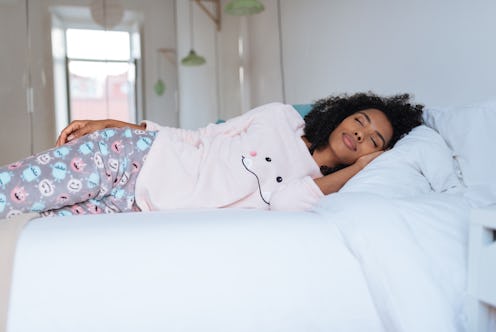Life
5 Weird Ways Cold Weather Can Mess With Your Sleep

When the weather cools, many of us idly dream of becoming bears and hibernating in a warm burrow until spring comes again. While the cozy season won't exactly force you into a months-long snooze, cold weather can affect your sleep in ways you might not expect. Sleep patterns are affected by many different factors in the body and the environment, and as days get shorter and wind begins to howl, our rest can be affected in unusual ways.
Sleep science is an emerging area of research, and scientists are still understanding the many different ways in which weather, humidity, and temperature can affect how you sleep. The tie between winter and shifting sleep has been interesting observers for hundreds of years. Medieval doctors noted that sleep seemed to "cool" bodies, though they tied it to their belief that health was controlled by hot and cold "humours" like phlegm and bile, and thought that excess sleep caused cold humours to increase. These days, researchers know a lot more about the ways in which the sleeping body is affected by the world, and it's not anything to do with phlegm (though colds can affect your sleep if you're woken up by your own sneezing). Here are a few unusual ways your sleep may change as the days (and nights) get colder.
1Cooler Temperatures Help You Drop Off
While many of us like to pile on cozy blankets at night, the National Sleep Foundation maintains that the best way to doze off sooner is to sleep in a cooler room, and the reason why has to do with your body's natural temperature cycles. "During the course of a normal day, your body temperature rises and falls slightly," the National Sleep Foundation writes. "As you become drowsy, your temperature goes down, reaches its lowest level around 5:00 a.m., and climbs slightly as morning begins. This is why the air in your room can affect the quality of your sleep: if it's too hot, it may interfere with your body's natural dip and make you more restless through the night." So don't turn your thermostat up once temperatures begin to dip; it might help your sleep.
2Sleeping In A Draft Makes Your Sleep "Shallow"
Despite what your nan might have said about the powers of fresh air, sleeping with the window open to winter breezes, or even in the path of a draft under a door, is scientifically proven to cause sleep problems. A study in 2017 found that being in the pathway of moving cool air, whether it was an air conditioner in summer or a draft in winter, caused people to shift more in their sleep, have a higher heart rate and wake up more. Block that draft in your window if you can.
3Lack Of Light In Winter Means Longer Sleep
The other awful part about winter, other than the cold, is of course the lack of light as the days get shorter. If you start feeling sleepy as soon as it hits 4 p.m., you're not alone. Access to natural light, just like temperature, can affect your body's circadian rhythm, aka your natural cycle of sleepiness and wakefulness. Low light also increases your production of melatonin, a hormone that stimulates sleepiness.
4Cold Makes Your Body Work Harder
A study in 2012 found that when it comes to sleep quality, heat and cold have different effects. Hot and humid weather causes people to sleep less deeply, wake up a lot, and report less refreshing sleep, which will not be news to you if you've ever tried to sleep through a heatwave. Cold weather, though, does something interesting: people sleeping in cold conditions have perfectly fine sleep and feel well-rested, but their bodies work a little harder. Heart rates appear to go up during winter in sleepers, as do blood pressure rates, which the scientists behind the study suggest might be why there are high heart attack rates in winter.
5Winter Produces Lower Levels Of Sleep-Disrupting Stress Hormones
Summer is relaxing and winter is stressful, right? Not according to science. A study in 2018 by the American Physiological Society found that cortisol, a stress hormone that increases and lowers throughout the day, and should be lowest at night, is at its peak in summer and eases off during the winter. This has an impact on how we sleep, because cortisol interferes with sleep mechanisms when it's too high. Feeling less stressed at nighttime may be part of why winter sleep feels satisfying and snuggly; cortisol levels might be naturally lower.
6
Sleeping in a cold room with just your nose poking out from under the blankets has never looked so appealing. Don't overheat yourself with five sets of bed socks and eight water bottles; trust that a little coolness will help you drift off into peaceful hibernating slumber.